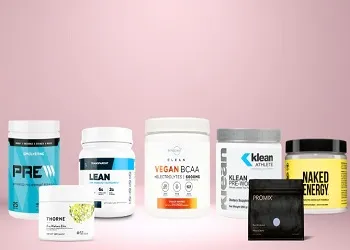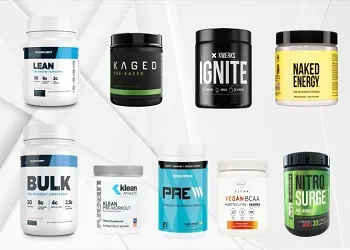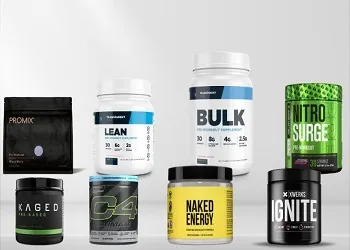Whether it’s for building lean muscle, improving strength, achieving weight loss, or enhancing overall performance and recovery, supplements can play a key part in reaching your fitness goals.
I tend to follow the “food-first policy” (boring, I know), but it’s the truth! Dietary supplements are not nearly as crucial as following a well balanced diet and consistent workout regimen, but women’s supplements for working out can definitely play a role in fitness outcomes and healthy aging.
In this article, we’ll talk about the best supplements for active women to take at any life stage, and how to most effectively use these supplements to support muscle growth and maintenance, fat burning, and bone health, as well as discuss the nuances of sports nutrition for women.
Table of Contents
Best Women’s Fitness Supplements
Protein
Protein is made up of amino acids, so I have not included a separate section for amino acid supplements on this list. The pros and cons between a protein powder and amino acids is a complex topic for another time. But if you want to learn more, check out this EverFlex post on the best amino acid supplements.
Types
Protein powders may come in the form of animal-based or plant-based protein. Whey protein is the most common protein powder, but there are numerous vegan options like soy, pea, hemp, and rice. The amino acid profile matters when discussing the use of protein for building muscle.
It varies by brand, but some plant-proteins are complete proteins (meaning they contain all nine essential amino acids (EAAs)) and some are not. Branched-chain amino acids (BCAAs) are a subset of EAAs. These three amino acids include leucine, isoleucine, and valine. It’s recommended that supplements contain 2–3 grams of leucine, as it is the main amino acid that stimulates muscle protein synthesis (MPS).
Timing
Protein supplement timing is not nearly as important as meeting the required amount. However, it is beneficial to consume protein after a workout to repair muscle tissue and promote muscle growth.
For women, supplementing with protein can be especially important during the luteal phase of the menstrual cycle when hormones (progesterone) are high and cause a higher muscle breakdown rate, lowering the capacity of muscle protein synthesis.
Amount
Protein requirements will vary with age, but women should prioritize protein throughout the lifespan regardless of activity level. However, more active individuals or those focusing on building muscle should try and consume 1.4–2.0 grams of protein per kilogram of body weight per day. This is higher than the recommended dietary allowance (RDA) for protein which is 0.8 grams of protein per kilogram of body weight.
Be sure to use a protein powder that has 20–30 grams of protein per serving to ensure you’re getting enough protein to build lean muscle.
Pre-Workout
Some fitness enthusiasts swear by pre-workout supplements. They are not necessary, but they can help set the stage for effective workout sessions. Choosing the best pre-workout will depend on what ingredients are the most important to fuel your more intense workouts.
Specific pre-workout ingredients will vary by different pre-workout supplement brands. Sometimes with pre-workout blends, manufacturers add a lot of ingredients, but there are also organic pre-workout options available with cleaner ingredient lists. Be sure and keep an eye out for unnecessary flavors, additives, and fillers by using a clean pre-workout supplement.
Common ingredients in pre-workout include:
- Caffeine for alertness
- Beta-alanine to prevent fatigue
- Nitrates to increase blood flow
- B vitamins for energy
- Creatine for enhanced power and sustained energy
- Amino acids to help build muscle
- Electrolytes to help manage adequate hydration during a workout
Caffeine has been linked to improved concentration and alertness, fat oxidation, and enhanced exercise performance. Caffeine may come in the form of pre-workout powders, coffee, green tea extract, or matcha.
On the other hand, caffeine may not be the best thing for women during and after perimenopause since caffeine interacts with sleep and may enhance negative symptoms associated with perimenopause.
Creatine
We love creatine around here for many reasons. Creatine is a well-studied supplement proven to be particularly effective at improving muscle strength and power for short bursts of high intensity exercise. Creatine supplementation has also been shown to improve muscular endurance, providing users with the ability to perform longer resistance training sessions.
Additionally, creatine may be even more beneficial for women. There is some promising research that indicates creatine may be beneficial for reproductive health, hormonal changes, bone health, muscle loss, and brain health.
It has been noted that some women are concerned about weight gain associated with creatine, but in actuality any weight gain from creatine is small and it is normally due to water retention in the muscle. Weight gain is also more likely to occur during or soon after a creatine loading phase and some research suggests sudden weight gain from creatine supplementation is more likely to occur in men.
Type
There are a few other types of creatine but creatine monohydrate is recommended. This is also the form that most supplement brands use.
Timing
Creatine can be taken before a workout for energy and power or after a workout if the user is more focused on muscle recovery.
Amount
The recommended daily dose of creatine is 3–5 grams. If you want to do a loading phase with creatine, this involves taking 0.3 grams per kilogram of body weight daily for 5–7 days, then following this loading phase with a daily maintenance dose of 3–5 grams. For example, a 67-kg woman would take 20 g of creatine for 5–7 days in 4–5 gram doses; then after the load phase, the dose would decrease to 3–5 grams/day for maintenance. There are currently no indications for when someone should stop taking a daily maintenance dose of creatine. It is generally regarded as a very safe and effective supplement long term.
HMB (β-Hydroxy-β-Methylbutyrate)
As we age, women tend to lose muscle mass (sarcopenia) at a higher rate than men. A recent 6-week trial in overweight women suggests that HMB can improve muscle mass in overweight middle-aged women (age 40–60). There is also a study that suggests HMB may be more effective when paired with vitamin D.
Omega-3
Omega-3 supplements such as fish oil or krill oil can be beneficial for anyone who doesn’t consume enough through diet alone. Omega-3 is a type of essential fatty acid that our body doesn’t make, so we must get it from food or supplements.
Omega-3s support a healthy gut and have anti-inflammatory effects which is always beneficial when dealing with menstrual pain. Additionally, omega-3s may be linked to lower risk of osteoporosis in women.
Amount
There are three omega-3 fatty acids: AHA, DHA, and EPA. A recommended amount only exists for ALA which is 1.1 grams daily for women. One should not exceed 5 grams per day total of DHA and EPA.
Prebiotics and Probiotics
Gut health is explicitly tied to hormones. Maintaining a healthy gut microbiome is essential for all humans, but it’s perhaps even more crucial for women at all life stages. Women are more likely to suffer from gastrointestinal issues such as irritable bowel syndrome (IBS) and constipation.
Type
I’ll proceed with caution on this one, because gut health is so complex and not all probiotic supplements are created equally. Full disclosure, there are billions of different bacteria strains, meaning we can’t possibly study all of them. That said, some companies are taking educated guesses at what strains to include in their probiotic products.
Probiotic supplements may also be beneficial for weight loss. There are only certain strains that have been clinically tested to support weight loss, however.
Timing
Prebiotics and probiotics can be taken at any time throughout the day.
Amount
Look for probiotic supplements that contain at least one billion colony forming units (CFU).
Greens Powder/Superfood Blend
Adding a greens powder or superfood blend can be a good supplement for anyone, not just women.
Type
There are so many on the market that it can be difficult to choose which one to add to your diet. Some will simply contain dehydrated greens like broccoli, kale, alfalfa, spinach, etc. Others will contain “superfoods” like certain extracts, algae, grasses, and adaptogens. It all depends on the results you are after and your price range as these blends can get quite pricey.
Timing
Greens and superfood powders can be consumed any time of day. Just bear in mind that adaptogens and green tea extract found in some powders can increase alertness and impact sleep, so they may be best to consume in the morning.
Amount
Always stick to the recommended serving size on the package labeling. These products contain vital micronutrients and minerals, but it is entirely possible to have too much of a good thing.
Multivitamins
Similarly to a superfood blend, this is more for overall health but overall health tends to impact your workout performance.
Type
If you’re considering adding a multivitamin to your diet, it may be best to focus on ingredients that women are more likely to be deficient in such as iodine, vitamin D, calcium, iron, B-12, and folate.
Timing
These can be taken any time of day, but it’s usually wise to take them around the same time every day to establish a routine.
Amount
You should always adhere to the dosage instructions provided, unless a doctor has instructed otherwise.
Understanding Women’s Fitness Needs
First of all, women are not just small men, so the information used in male fitness realms doesn’t always apply to everyone in the gym. In recent years, we’ve seen an increased interest in gender-specific sports nutrition. A 2022 paper essentially serves as a call to action by researchers and experts in this space. Women operate on a 28-day cycle with hormone fluctuations, which can have a direct impact on diet and fitness.
There is a lot we don’t know about requirements tailored to women because much of the clinical sports science research has focused on men as the gold standard. Women are traditionally underrepresented in research for a few reasons. Women tend to be “messier” research participants because as we know, females have hormonal fluctuations that are difficult to quantify that may confound data. Also, pregnant and breastfeeding women are excluded from many trials, depending on the research question.
Life Stages
Women experience a few different hormonal life stages that will impact their energy requirements and nutritional needs.
Pregnancy
It’s important to note that physical activity is important at any stage of life, including pregnancy and postpartum. To be clear, pregnancy comes with its own set of nutrition recommendations and supplements and pregnant women should be consulting with their doctor or obstetrician regarding supplementation.
Premenopause
This is the range of time from the first period to when a woman starts experiencing perimenopause; during this time, most females experience regular 28-day cycles.
A menstrual cycle consists of the follicular phase (days 1–14) and luteal phase (days 15–28). The follicular phase is commonly referred to as the “low-hormone phase,” while the luteal phase is the “high-hormone phase.” Women in these phases may have different nutritional requirements.
Perimenopause
Also referred to as the menopausal transition, this is typically the decade before menopause. There are supplements specific to this stage of life that may help manage the negative side effects encountered during perimenopause.
Menopause/Postmenopause
Menopause officially begins one year after a woman’s final period. Women are encouraged to remain active and keep up adequate nutrition to maintain healthy bones and muscles for healthy aging.
Wrap Up
The eight best supplements physically active women can implement into their routines are protein, creatine, pre-workout, HMB (for age 40+), superfood blends, and a multivitamin. Sports nutrition for women is clearly a research gap, so more large-scale trials are needed to investigate the effect of supplements specifically on women.
For individualized advice tailored to your specific health needs, consider booking a consultation with a health and fitness expert at EverFlex.
Frequently Asked Questions
What are the best post-workout supplements for females?
The best post-workout supplements for females include protein and creatine. Adequate water intake is always important post-exercise as hydration is especially key after extremely long workouts or after exercising in heat that involves a lot of sweat loss.
What are muscle building supplements for women?
Muscle building supplements for women include protein, EEAs (including BCAAs), and creatine.
What are the best protein supplements for women’s muscle growth?
The best protein supplement for muscle growth is whey protein; however, similar results can be achieved using a blend of plant proteins.
What is the best pre-workout for women?
The best pre-workout for women will include key ingredients such as caffeine, nitrates, and amino acids and will not include any additives, fillers, or artificial flavors.
References














This is pretty useful information. Thank you for sharing this.